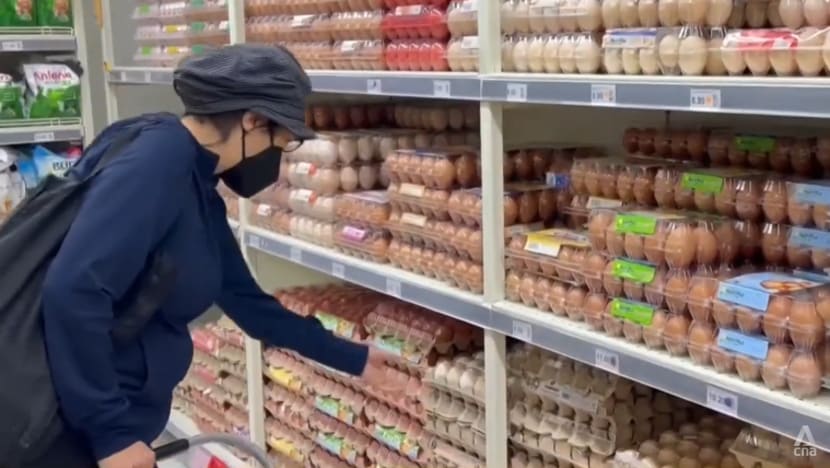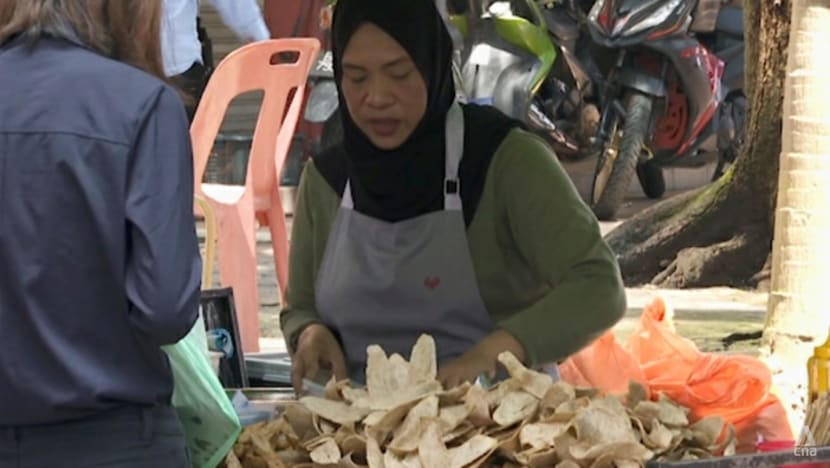Malaysian PM Anwar scrambles to tackle egg shortage and soaring food prices
Apart from eggs, Mr Anwar, who rose to the country’s top job last week, will have to start reining in prices of other essential items.

A consumer shops for eggs in Malaysia.
KUALA LUMPUR: Just days after assuming the post of Malaysia’s prime minister, Mr Anwar Ibrahim's first task is tackling the cost of living issue. None is more pressing than addressing an ongoing egg shortage, as far as voters are concerned.
Although the problem has been prevalent for the past few months, consumers hope the newly minted leader will help to improve the situation.
The shortage of eggs – the cheapest source of protein for many in Malaysia – was an issue seized upon by Mr Anwar in the lead up to the recent election to criticise the previous government.
“Why were Muhyiddin and Ismail Sabri promising this and that when there’s not even enough eggs,” he had said during an election campaign in Putatan, Sabah.
DEALING WITH THE EGG SHORTAGE
Now, the task falls on Mr Anwar and his soon-to-be-formed government to ensure that a steady supply of eggs returns to the shelves.
While a check by CNA at several hypermarkets in Kuala Lumpur found that there were supplies of eggs on Wednesday and prices appeared to be steady, the capital is among those that have been previously hit by shortage.
Malaysia’s Domestic Trade and Consumer Affairs Ministry on Tuesday said that it will work with different states to balance the egg supply, ensuring that states with excess, such as Melaka, can route supplies to states with shortage, such as Kuala Lumpur.
The ministry urged consumers to refrain from panic buying, saying that would worsen the problem.
Apart from eggs, Mr Anwar, who rose to the country’s top job last week, will have to start reining in prices of other essential items.
According to the Office for National Statistics (ONS), food inflation in the 12 months to September hit 15 per cent. Economists warned it could increase to between 17 and 19 per cent next year.
Shortly after being appointed to the position by the king, Mr Anwar in his first address said that his primary focus would be to manage the cost of living and tackle rising prices.
Related:
VOTERS GIVE ANWAR MORE TIME
Shoppers who spoke to CNA said that it has been too soon since Mr Anwar took the reins to really make any difference, and they are willing to give him more time and space to do his job.
“Not so soon lah, he is so busy. It will come, give him time, he will do it,” said one Malaysian.
“You don’t say ‘I’m the prime minister today, and tomorrow I will have eggs on the shelves’. It takes 52 days. For a chicken to lay an egg, it takes a period of 52 days,” said Mr Ameer Ali Mydin, managing director of retail chain Mydin Mohamed Holdings.
However, retailers said they are hoping that the prime minister and his government will come up with a swift solution, preferably before the holiday season goes into full swing.
“Everywhere there’s a shortage and why there’s a shortage I think we must look at the structure. The cost is higher, that’s what the breeders are telling us,” said Mr Ameer Ali.
“If this problem is not solved seriously and quickly, we have Christmas and (during) Christmas (there’s) cakes (and sweets) – everything that uses eggs. Then we have got Chinese New Year coming, then Hari Raya…” he said.
Industry players said that the shortage was largely due to poultry farms slashing production on the back of increased prices of chicken feed.
PROBLEM EXTENDS BEYOND EGGS
Concern over food prices is not specific to eggs, voters said, pointing to other items that are also heavily subsidised but, too, suffer from erratic supplies, such as chicken and cooking oil.
“I still don’t have the packet cooking oil in my store. You know we just put up in the morning and it finished because there's a lot of leakages of cooking oil,” said Mr Ameer Ali.
He went on to explain that Malaysia’s borders are porous – some of the heavily subsidised poly bag oils, also known as lower grade cooking oil, are smuggled to neighbouring countries such as Thailand, causing a limited supply for Malaysian consumers.
“The government is aware of this but somebody must have the political will to make the decision (to fix this)," he said.
Malaysia spent RM$4 billion (US$908 million) to subsidise cooking oil for the lower income group and small traders, but many have said they do not get to fully enjoy the subsidies.

“It’s really hard to purchase poly bag cooking oil. I can only find two bags a week and that’s not enough. The bottled ones are way too expensive,” said street peddler Isah Hassan, who sells deep fried keropok, or fish crackers.
Apart from rolling back subsidies, dismantling the cartels and removing the middlemen are some issues that the prime minister may have to tackle in order to improve the cost structure.
“You cannot expect business as usual, things must change, starting with leadership,” said Mr Anwar.
“Issues of procurement, and awarding contracts without tender, cannot continue. The country can no longer allow any more leakage, pilferage, and corruption,” he added.


















